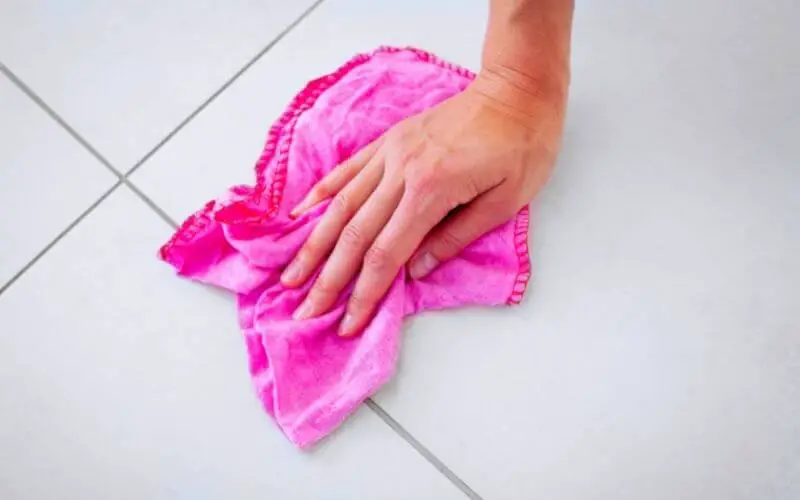Picture this: you’ve just finished mopping your kitchen floor with Pine-Sol, the air is pleasantly crisp, and you’re ready to relax. But then a nagging question pops into your mind, “Do I really need to rinse this stuff off?” You might be tempted to skip the rinse, thinking a quick swipe with a dry mop will do the trick. However, the truth is a bit more nuanced. The answer to this seemingly simple question depends on a few factors, including the type of tile, the amount of Pine-Sol used, and your personal preference for shine and cleanliness.

Image: floortechie.com
Pine-Sol, a popular household cleaner known for its distinctive pine scent and disinfectant properties, can be a powerful ally in the war against grime and bacteria. Yet, like any powerful tool, using it correctly is crucial. Understanding the potential benefits and drawbacks of rinsing Pine-Sol off tile floors is key to making informed decisions about your cleaning routine.
Understanding the Debate: Rinse or No Rinse?
The debate about rinsing Pine-Sol off tile floors boils down to the potential trade-offs between a thorough clean and a potentially slippery surface. Let’s dive into the pros and cons of both sides:
Pro-Rinse: The Case for Spotless Floors
For those who prioritize a spotless, streak-free shine, rinsing Pine-Sol off tile floors is often the preferred method. Here’s why:
- Eliminates Residual Pine-Sol: Leaving Pine-Sol residue on the floor can lead to a hazy appearance, dulling the tile’s luster. Rinsing ensures that the surface is completely free from any leftover cleaner.
- Prevents Slippery Surfaces: Pine-Sol’s disinfecting power is a result of its strong chemical composition. While effective, this strength can create a potentially hazardous slippery surface, especially when mixed with water. Rinsing reduces the risk of accidental falls.
- Safe for Pets and Children: Pets and small children are naturally drawn to exploring their surroundings, including floors. Thoroughly rinsing Pine-Sol minimizes the risk of accidental ingestion, ensuring a safer home environment.
Pro-No Rinse: Efficiency and Convenience
For some, the convenience and efficiency of skipping the rinse outweigh the potential downsides. Here’s the argument for skipping the rinse:
- Time and Effort Savings: The extra step of rinsing can add significant time to your cleaning routine. For those seeking a quick and straightforward solution, skipping the rinse can save valuable time and effort.
- Disinfection Advantage: While residual Pine-Sol can create a slippery surface, it also acts as an ongoing disinfectant. For high-traffic areas prone to bacteria and germs, this continuous disinfecting effect could be advantageous.
- Less Water Usage: Rinsing requires a significant amount of water, which can be a concern for those looking to conserve resources. Skipping the rinse reduces water consumption.

Image: floorcarekits.com
Key Factors to Consider
Ultimately, the decision to rinse or not comes down to your personal preferences and the specific circumstances. Here are some important factors to consider:
1. Type of Tile:
The type of tile can influence whether rinsing is necessary. For example, porous tiles like natural stone or unsealed grout might absorb Pine-Sol more readily, requiring a thorough rinse to prevent discoloration or dulling. Sealed tiles, however, are less likely to absorb the cleaner, making rinsing less crucial.
2. Amount of Pine-Sol Used:
The concentration of Pine-Sol used plays a significant role. Using a relatively dilute solution, especially for routine cleaning, might make rinsing less essential than using a highly concentrated solution for a deep clean.
3. Frequency of Cleaning:
For daily or frequent mopping, the residual Pine-Sol might be less of a concern, as fresh cleaning sessions would continually replenish the disinfectant effect. However, for less frequent cleaning, rinsing might be more advisable to prevent a build-up of residue.
Tips for Reducing the Risk of Slippery Floors
If you choose to skip the rinse, follow these tips to minimize the risk of slippery surfaces:
- Use Less Pine-Sol: Avoid using excessive amounts of Pine-Sol, as this can lead to an overly concentrated solution and increased slipperiness. Opt for a dilute mix.
- Proper Mop Technique: Squeeze out excess water from the mop before applying Pine-Sol. This reduces the amount of cleaner used and minimizes the chances of a slippery floor.
- Thorough Drying: Once you’ve mopped, allow the floor to dry completely before walking on it. This prevents the surface from remaining slippery due to wetness.
- Warning Signs: Consider placing warning signs or placing caution tape around the mopped areas to alert others of the slippery surface until the floor has dried.
Alternatives to Pine-Sol for Tile Floors
If you’re hesitant about using Pine-Sol due to its potential for slipperiness, there are other effective cleaning solutions for tile floors.
- Vinegar: A natural and versatile cleaner, vinegar can effectively remove grime and bacteria from tile floors. It typically does not require rinsing unless used in a very concentrated solution.
- Baking Soda: A gentle abrasive, baking soda can tackle tough stains and grime. It can be sprinkled onto the floor, left to sit for a few minutes, then scrubbed with a damp sponge or brush. Baking soda also offers deodorizing properties.
- Commercial Tile Cleaners: Many commercial tile cleaners are specifically formulated for safe use on various tile types and often do not require rinsing. Read label instructions carefully.
Do You Have To Rinse Pine Sol Off Tile Floors
Conclusion
The decision to rinse Pine-Sol off tile floors depends on a combination of factors, including the type of tile, the concentration of the cleaner, and your personal preferences. While a thorough rinse ensures a spotless, streak-free shine and eliminates the risk of a slippery surface, skipping the rinse can save time and effort and provide ongoing disinfecting power. The most important thing is to choose a cleaning method that meets your specific needs and preferences. Remember to always prioritize safety, especially for children and pets, and to use cleaning products responsibly.






